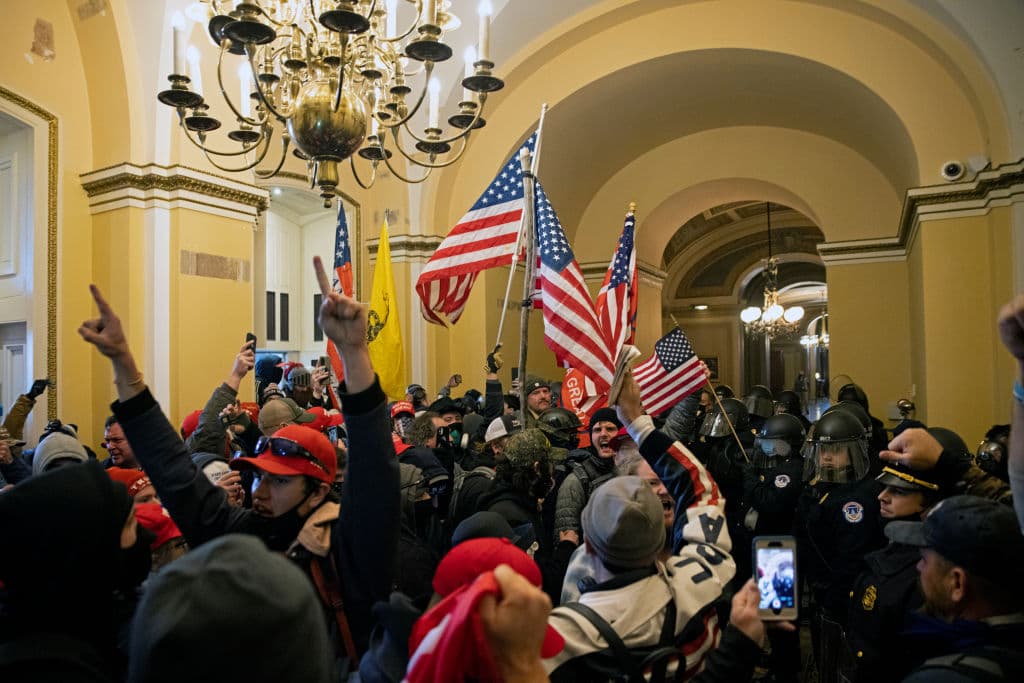Federal Appeals Court Upholds Trespassing Charge Used Against Hundreds of January 6 Rioters
More than 1,400 January 6 defendants have been charged with trespassing on restricted federal grounds.

A split federal appeals court panel on Tuesday upheld a trespassing charge against a January 6 rioter, Couy Griffin — a charge that has also been applied to hundreds of others — affirming that rioters “knowingly” breached restricted areas that day even if they didn’t know the basis of that restriction — that the Secret Service was protecting then-Vice President Pence, who was inside.
At issue in the case before the D.C. Circuit Court of Appeals was a federal law that prohibits “knowingly” entering “restricted building or grounds,” defined as any “posted, cordoned off, or otherwise restricted area,” including restricted areas where the “president or other person protected by the Secret Service” is visiting.
Mr. Griffin, a founder of Cowboys for Trump and a former New Mexico county commissioner who was ousted from his position under the 14th Amendment’s insurrection clause, had argued that the government must prove that he knew the reason why the area was restricted for him to have “knowingly entered.” He also argued that because so many rioters before him had trampled the signage along the area, the restricted grounds were no longer clearly “posted, cordoned off, or otherwise restricted.”
More than 1,400 January 6 defendants have been charged with “entering or remaining” on restricted federal grounds, the Justice Department has said, meaning that hundreds of charges could have been undermined if the court had ruled in Mr. Griffin’s favor.
It is not immediately clear whether this case will reach the Supreme Court, but the appellate court’s decision indicates divided legal views on the trespassing issue. Judges Cornelia Pillard, a President Obama appointee, and Judith Rogers, a President Clinton appointee, made up the majority for the three-judge panel, while Judge Gregory Katsas, a President Trump appointee, dissented.
“The defendant says a person ‘knowingly enters’ the restricted safety zone only if he knows that the basis of the restriction is to safeguard a Secret Service protectee,” the majority’s opinion reads. “We hold that knowingly breaching the restricted area suffices, even without knowing the basis of the restriction — here, the presence of Vice President Pence at the Capitol on January 6 — which merely confirms that such trespasses are within Congress’s legislative authority.”
The judges noted that Congress intended to criminalize trespassing that could endanger protectees of the Secret Service “regardless of the trespasser’s awareness of the basis for Congress’s authority to regulate them.”
“And a contrary interpretation would impair the Secret Service’s ability to protect its charges,” the opinion states. “It would require Secret Service agents preventing members of the public from encroaching on a temporary security zone to confirm that each intruder knows that a person under Secret Service protection is or is expected to be there.”
The majority noted that Mr. Griffin “knowingly intruded into the area of the United States Capitol grounds that had been restricted in order to protect Vice President Pence on January 6, 2021, during the counting of the electoral college votes for President” and that he stayed there for two hours.
The dissent expressed concerns that the majority’s stance could “substantially” broaden the law’s trespassing prohibitions.
“For example, it ensnares a hotel guest who walks past an ‘area closed for private event’ sign in search of an open bar if, unbeknownst to the thirsty interloper, the First Lady is expected to attend … Likewise, it ensnares an individual who stepped over temporary plastic fencing just outside the Capitol grounds on January 5, 2021, to save a few steps on a walk home from work, even if he was unaware of the impending arrival of the Vice President,” Judge Katsas wrote. “Such improbable breadth suggests that something has gone awry.”
The Sun reached out to Mr. Griffin’s public defender and the attorney representing the federal government for comment.

